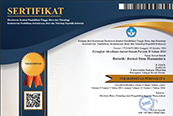Antonio José Bolivar is Us: Image of the postcolonial subject in Luis Sepúlveda’s The Old Man Who Read Love Stories
(1) Sanata Dharma University
(*) Corresponding Author
Abstract
The Old Man Who Read Love Stories is a novel by Luis Sepúlveda that was translated and published for the first time in Indonesia by Marjin Kiri at the end of 2005. The novel, originally titled Un viejo que leía novelas de amor, is a canonical work of Latin American literature that was published in 1989. The plot clearly depicts the postcolonial situation in Latin America. Unfortunately, postcolonial readings of this translated novel are very minimal. In a postcolonial context, the work of translating texts cannot be considered as a job that is arbitrarily chosen, whimsical, or even without political charges behind the scenes. Especially if the text being translated comes from third world and/or formerly colonized countries. The translator will certainly have fundamental reasons in selecting and choosing a text (postcolonial literature) to be translated. Thus, I decided to do an alternative reading that can be used on this translated novel using the concept of hybridity by Homi K. Bhabha. On the other hand, I also want to see how far Luis Sepúlveda depicts the postcolonial phenomenon in Latin American society as a formerly colonized society represented through conflicts in his novel. Because the reality in the novel is the reality experienced by Luis Sepúlveda when he was on an expedition with UNESCO for seven months in the territory of the indigenous Shuar tribe in Ecuador. Reading the novel The Old Man Who Read Love Stories means reading how the author positions himself as the other in a different cultural institution. Then understanding these two contexts means we are trying to realize what the condition of our society in Indonesia is, as a fellow postcolonial society.
Keywords
Full Text:
PDF (Bahasa Indonesia)DOI: https://doi.org/10.24071/ret.v11i2.6126
Refbacks
- There are currently no refbacks.
Copyright (c) 2023 Ivo Trias Julianno

This work is licensed under a Creative Commons Attribution 4.0 International License.
Retorik: Jurnal Ilmu Humaniora is published by the Graduate Program in Cultural Studies at Sanata Dharma University, Yogyakarta, Indonesia.
Retorik is also available in print edition. Please click here for contact information.










